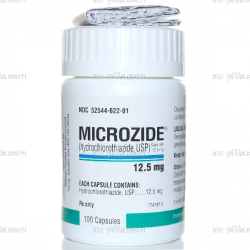Microzide (hydrochlorothiazide) Coupons, Discounts & Cost
Microzide (hydrochlorothiazide) is a drug with diuretic action. One way to save money on the Microzide retail cost regardless of income and insurance status is to use Microzide coupons or discount cards from RXCoupons. Use this Hydrochlorothiazide coupon at this online pharmacy and receive up to 75% off the sale price.
What should I know about Microzide?
Microzide (hydrochlorothiazide) is a drug with diuretic action. Microzide is used to treat arterial hypertension (as monotherapy or in conjunction with other antihypertensive drugs). It is often used in nephrogenic diabetes insipidus), edematous syndrome of various genesis (nephrotic syndrome, chronic heart failure, acute glomerulonephritis, premenstrual syndrome, chronic renal failure, treatment with corticosteroids). Hydrochlorothiazide is also indicated for the prevention of stone formation in the urogenital tract (to reduce hypercalciuria).
Microzide contraindications
Microzide (hydrochlorothiazide) should NOT be used in case of hypersensitivity to the drug, anuria, unmanageable diabetes, severe renal failure, Addison's disease, hypercalcemia, hypokalemia, hyponatremia. It should be avoided during the first trimester of pregnancy and during lactation. Caution should be exercised when using hydrochlorothiazide in women during II-III trimesters of pregnancy.
How can I use Microzide?
Microzide (hydrochlorothiazide) is administered in a daily dose of 25-50 mg. As a rule, the drug is used for a long period of time in conjunction with other antihypertensive drugs: ACE inhibitors, vasodilators, beta-blockers, sympatholytic agents
Higher doses of hydrochlorothiazide (100 or 200 mg) are ineffective.
In case of edema, the daily dose may vary from 25 to 100 mg. The drug is taken once a day in the morning or in the first half of the day (in 2 divided doses). Elderly patients usually take 12.5 mg 1-2 times a day.
The dose for children from 2 months to 14 years is of 1 mg/kg per day. The maximum daily dose is determined by age: children under 6 months - 3.5 mg/kg; children under 2 years - 12.5-37.5 mg; children aged 3-12 years - 100 mg.
As a part of maintenance therapy, Microzide is used 2 times per week.
Microzide may be used for reducing intraocular pressure (25 mg once in 1-6 days).
In case of diabetes insipidus, patients should take 25 mg 1-2 times a day (with a gradual increase in dose to 100 mg).
Microzide side effects
Gastrointestinal tract: pancreatitis and cholecystitis, constipation, cholestatic jaundice, diarrhea, anorexia.
Nervous system: temporary blurry vision, dizziness, paraesthesia, headache.
Cardiovascular system: vasculitis, orthostatic hypotension, arrhythmia, agranulocytosis (very rarely), leukopenia, hemolytic anemia, thrombocytopenia, aplastic anemia, hyponatremia (convulsions, confusion, lethargy, irritability, fatigue, muscle cramps), hypomagnesemia, hypokalemia, hypercalcemia (thirst, dry mouth, irregular heartbeat, muscle pain, vomiting, nausea, unusual weakness or tiredness).
Metabolic effects: glycosuria, hyperglycemia, hyperuricemia.
Hypersensitivity reactions: purpura, rash, Stevens-Johnson syndrome, necrotizing vasculitis, photosensitivity, respiratory distress syndrome (including noncardiogenic pulmonary edema and pneumonitis), anaphylactic shock.
Other reactions: renal failure, reduced potency, interstitial nephritis.
Microzide special instructions
Patients should carefully monitor electrolytes and check for signs of an imbalance (especially patients with diseases of the cardiovascular system, impaired liver function, as well as patients who suffer from severe vomiting, thirst, dry mouth, weakness, drowsiness, restlessness, muscle pain, tachycardia, muscle weakness, oliguria, hypotension, gastrointestinal tract disorders).
It is recommended to take drugs or foods rich in potassium (fruits, vegetables) to avoid hypokalemia.
Hydrochlorothiazide may cause azotemia in patients with impaired renal function. The treatment should be stopped in case of oliguria. Patients with impaired liver function should use this drug with caution.
Microzide (hydrochlorothiazide) may impair glucose tolerance. Patients with lactose intolerance may suffer from gastrointestinal disorders.
It is prohibited to drive a vehicle at the beginning of treatment with hydrochlorothiazide.

